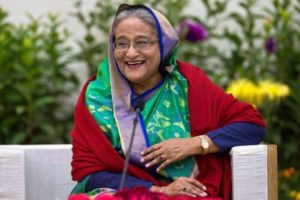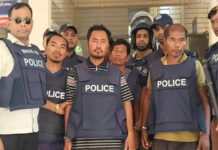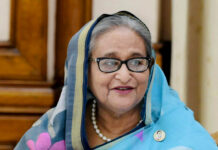Bangladesh elections return Sheikh Hasina for third-straight term as PM, amid claims of intimidation
31 December 2018 by ABC

Related Story: Deadly clashes and allegations of vote-rigging during Bangladesh elections
Related Story: Bangladesh police fire tear gas to disperse protesting students
Related Story: More than 140 drug dealers killed in Bangladeshi war on drugs
Official results confirm that Bangladesh’s ruling alliance won an overwhelming majority of seats in the country’s general election, giving Prime Minister Sheikh Hasina a third-straight term despite the opposition disputing the outcome amid allegations of intimidation.
Key points:
- The win makes Ms Hasina the longest-serving leader since independence
- Her coalition won 288 out of 300 seats
- The election run-up had been mired in violence and voter-intimidation
The coalition led by Ms Hasina’s Awami League party won 288 out of 300 seats — 96 per cent — in Sunday’s polls, according to Election Commission secretary Helal Uddin Ahmed.
The win makes Ms Hasina — Bangladesh’s 10th prime minister — the country’s longest-serving leader since independence, having held the office since 2009, in addition to a stint from 1996-2001.
The opposition alliance led by prominent lawyer Kamal Hossain won only seven seats.
The opposition rejected the outcome, with Mr Hossain calling the election “farcical” and demanding a new poll be held under the authority of a “nonpartisan government”.
But chief election commissioner KM Nurul Huda ruled out any revote, saying there were no reports of large irregularities.
“There is no scope to hold the election again,” Mr Huda said.
He said the turnout in Sunday’s vote was 80 per cent.
Mr Hasina’s main rival for decades has been former prime minister Khaleda Zia, the leader of the opposition Bangladesh Nationalist Party, whom a court deemed ineligible to run for office because she is in prison for alleged corruption.
In Ms Zia’s absence, opposition parties formed a coalition led by Mr Hossain, an 82-year-old former member of Hasina’s Awami League.
Ms Hasina met political leaders and senior military and civil officials at her office on Monday, the United News of Bangladesh agency reported.
More than a dozen killed in election-related violence
Indian Prime Minister Naredra Modi telephoned her and promised to continue to support Bangladesh under her leadership.
Ms Hasina said the victory was “nothing for her personal gain, rather it is a great responsibility toward the country and people”.
The opposition says Mr Hasina’s leadership has become increasingly authoritarian.
More than a dozen people were killed in election-related violence on Sunday, and the election campaign was dogged by allegations of the arrest and jailing of thousands of Mr Hasina’s opponents.
Mr Hossain said late on Sunday that about 100 candidates from the alliance had withdrawn from their races during the day.
He said the alliance would meet to decide its next step.
“We call upon the Election Commission to declare this election void and demand a fresh election under a nonpartisan government,” Mr Hossain said.
Calls to several Hasina aides seeking comment were not immediately returned.
‘This was a one sided election’
Bangladesh’s leading newspapers ran banner headlines, some in red, while television stations aired round-the-clock analysis.
A headline in the country’s leading English-language newspaper, the Daily Star, read, “Hat-trick for Hasina, BNP found missing in polling; atmosphere festive, tuned only to ruling party”, referring to the Bangladesh Nationalist Party.
In an editorial, the newspaper said “this was a one-sided election”.
“The blatant and starkest manifestation of an uneven state of affairs was the absence of polling agents of the opposition … in most, if not almost all, of the polling centres in the country,” it said.
The secretary-general of Ms Zia’s party, Mirza Fakhrul Islam Alamgir, won a seat in a twist victory.
He is a fierce critic of the Prime Minster and spearheaded the formation of the opposition alliance with Mr Hossain at the helm.
Mr Alamgir said on Sunday he was rejecting any outcome, but it was unknown after his win was declared what he would do now.
Opposition supporters report intimidation at the ballot box
Photo: The opposition reports that about 100 candidates withdrew their candidacy. (AP: Anupam Nath)
In the run-up to the election, activists from both the ruling party and the opposition complained of attacks on supporters and candidates.
The Daily Star said 16 people were killed in 13 districts in election-related violence on Sunday.
The Associated Press received more than 50 calls from people across the country who identified themselves as opposition supporters complaining of intimidation and threats, and of being forced to vote in front of ruling party men inside polling booths.
While rights groups have sounded alarms about an erosion of Bangladesh’s democracy, Ms Hasina has promoted a different narrative, highlighting an ambitious economic agenda that has propelled Bangladesh past larger neighbours Pakistan and India by some development measures.
Voters “will give us another opportunity to serve them so that we can maintain our upward trend of development, and take Bangladesh forward as a developing country,” Ms Hasina said after casting her ballot along with her daughter and sister in Dhaka.
Some 104 million people in the Muslim-majority country were eligible to vote, including many young, first-time voters, in Bangladesh’s 11th general election since independence from Pakistan.
Both sides were hoping to avoid a repeat of 2014, when Ms Zia and the BNP boycotted and voter turnout was only 22 per cent.
More than half of the 300 parliamentary seats were uncontested.
The Awami League’s landslide victory was met with violence that left at least 22 people dead.
About 600,000 security officials, including army and paramilitary forces, were deployed to counter violence.
The telecommunications regulator shut down mobile internet services nationwide to prevent the organising of protests.
AP









